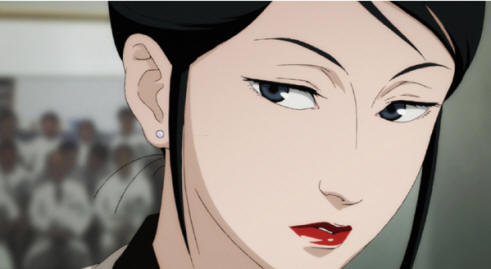INSIDE:
NEWS/STORIES/ARTICLES
Book Reviews
Columns/Opinion/Cartoon
Films
International
National
NW/Local
Recipes
Special A.C.E. Stories
Sports
Online Paper (PDF)
CLASSIFIED SECTION
Bids & Public Notices
NW Job Market
NW RESOURCE GUIDE
Archives
Consulates
Organizations
Scholarships
Special Sections
Upcoming
The Asian Reporter 19th Annual
Scholarship & Awards Banquet -
Thursday, April 20, 2017
Asian Reporter Info
Contact Us
Subscription Info. & Back
Issues
ASIA LINKS
Currency Exchange
Time Zones
More Asian Links
Copyright © 1990 - 2016
AR Home

Where EAST meets the Northwest
|
ANIME DREAM. Director Satoshi Konís anime film Paprika explores a future world in which a revolutionary psychotherapy device called the DC MINI allows users to cast themselves into the dreams of others. Megumi Hayashibara voices the character Atsuko Chiba, shown above. (Photo/ Madhouse, courtesy of Sony Pictures Classics) From The Asian Reporter, V17, #24 (June 12, 2007), page 1 & 20. Satoshi Konís Paprika is an anime dream come true Paprika Directed by Satoshi Kon Produced by Madhouse and Sony Pictures Entertainment (Japan) Inc. By Patrick Galloway Special to The Asian Reporter May 2, 2007, 9:00pm: I sat slurping ramen at Sapporo-ya, a beloved noodle joint in San Franciscoís Japantown. Next door, at the Sundance Kabuki cineplex, an exclusive showing of Satoshi Konís mind-bending sci-fi anime, Paprika, was about to begin. The vibe on the street was electric. The sidewalk was jammed with Japanese animation enthusiasts hoping for rush tickets, but I doubt many got in ó the sold-out screening, part of the San Francisco International Film Festival, was the anime event of the year. Finishing my meal, I reflexively touched the two advance tickets in my pocket and made my way toward the theater. Needless to say the house was packed. The lights went low and all at once I was plunged into an unexpected phantasmagoria of sound and color, a bracing, exhilarating journey of profound scope and impact. Detail-rich imagery came flying at me with a flourish and intensity that well-nigh defies description. Here was grade-A anime, above and beyond the herky-jerky, bubble-eyed stuff weíve come to know, photorealistic animation merged with the stuff of dreams. The story of Paprika concerns a new psychotherapeutic technology allowing access to peopleís dreams. The concept is not new to cinema; films such as Brainstorm (1983) and Dreamscape (1984) have covered similar ground. But whereas those films were limited by the constraints of live action (and somewhat ill conceived), here the medium is perfectly suited to the story, based on the novel by renowned Japanese sci-fi author Yasutaka Tsutsui. It seems one of the prototypes of the DC MINI, the filmís dream surveillance device, has been stolen and is being used to quite literally mess with peopleís heads. When kindly old lab Chief Shima starts babbling and attempts to jump out the window, it becomes apparent someone is using the DC MINI to induce a waking dream state, rendering him functionally insane. Attractive yet modest research psycho- therapist Dr. Atsuko Chiba uses the DC MINI to enter Chief Shimaís dream and bring him back to reality, whereupon the chief contacts his old friend, burly Detective Konakawa, requesting his help in recovering the stolen DC MINI. With the help of Paprika, a gutsy young lady who dwells wholly in the dream world (and has a secret connection to Atsuko), the protagonists set about solving the mystery, but things quickly get out of hand as the line between dream and reality begins to dissolve. Soon a Macyís-parade-style procession of giant Buddhas, jizos, and darumas, accompanied by all manner of frogs, bears, giant robots, walking traffic lights, and kitchen appliances, is marching down the streets of Shinjuku as smiling salarymen plunge from rooftops above; a menacing, 100-foot traditional ningyo doll terrorizes the city Gozilla style; Detective Konakawa suffers a recurring nightmare spanning various film genres; and through it all, there is plucky Paprika, giving her all to help her friends, be it as a flying girl, a butterfly fairy, a mermaid, or a winged gryphon. If there is a drawback to Paprika, it would be a surfeit of surreality. With its onslaught of fantastic imagery, some might experience "dream fatigue." But not this reviewer. Director Satoshi Konís narrative creativity and visual flair are a welcome change from the bland pablum that passes for film entertainment these days. Paprika is Konís fourth film, following Perfect Blue (1998), Millennium Actress (2001), and Tokyo Godfathers (2003), all superior achievements in what could be called "anime for adults." But with Paprika, Kon has well and truly topped himself. One can only imagine what heíll come up with next. Paprika will be shown June 22 through 28 at Portlandís Cinema 21, located at 616 N.W. 21st Ave. For show times, call (503) 223-4515 or visit <www.cinema21.com>.
|

